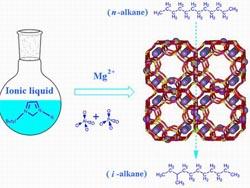
A research team headed by Prof. TIAN Zhijian with the CAS Dalian Institute of Chemical Physics has made remarkable progress in the synthesis of zeolites, the aluminosilicate members of the family of microporous solids known as "molecular sieves." The result was published in a recent issue of Chemistry-A European Journal .
Zeolites are widely used as ion-exchange beds in domestic and commercial water purification, softening, and other applications. In chemistry, zeolites are used to separate molecules (only molecules of certain sizes and shapes can pass through), as traps for molecules so they can be analyzed. Zeolites have the potential of providing precise and specific separation of gases including the removal of H2O, CO2 and SO2 from low-grade natural gas streams. Other separations include noble gases, N2, O2, freon and formaldehyde. However, at present, the true potential to improve the handling of such gases in this manner remains unknown.
Recently, WANG Lei, XU Yunpeng and co-workers successfully introduced magnesium into the framework of the aluminophosphate zeolite via an ionothermal procedure, thus creating a new type of pure crystalline zeolite, MAPO-11.
Moreover, by supporting platinum onto this newly synthesized molecular sieve, the resulting catalyst showed excellent reactivities in the hydroisomerization of hydrocarbons, exhibiting a very promising commercial prospect.
This research project was supported by the National Natural Science Foundation of China.
Related News
Photos
More>>trade
- Sino-German team finishes field investigation into Tibetan lakes
- Successful automatic flight of a rotorcraft flying robot
- Deficiency of a -arrestin-2 Signal Complex Causes Insulin Resistance
- CAS Academician Chen Zhu Nominated ''People to Watch in 2009''
- China's Second National Assessment Report on Climate Change Being Drafted





